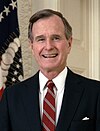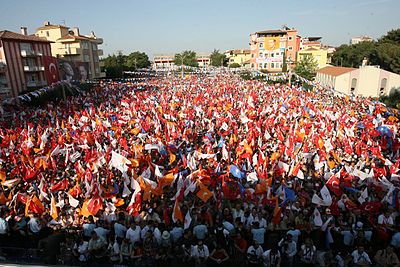| Main page | Showcase | Project |
Introduction
Conservatism is a cultural, social, and political philosophy and ideology, which seeks to promote and preserve traditional institutions, customs, and values. The central tenets of conservatism may vary in relation to the culture and civilization in which it appears. In Western culture, depending on the particular nation, conservatives seek to promote and preserve a range of institutions, such as the nuclear family, organised religion, the military, the nation-state, property rights, rule of law, aristocracy, and monarchy. Conservatives tend to favour institutions and practices that enhance social order and historical continuity.
Edmund Burke, an 18th-century Anglo-Irish statesman who opposed the French Revolution but supported the American Revolution, is credited as one of the forefathers of conservative thought in the 1790s along with Savoyard statesman Joseph de Maistre. The first established use of the term in a political context originated in 1818 with François-René de Chateaubriand during the period of Bourbon Restoration that sought to roll back the policies of the French Revolution and establish social order.
Conservatism has varied considerably as it has adapted itself to existing traditions and national cultures. Thus, conservatives from different parts of the world, each upholding their respective traditions, may disagree on a wide range of issues. Historically associated with right-wing politics, the term has been used to describe a wide range of views. Conservatism may be either libertarian or authoritarian, populist or elitist, progressive or reactionary, moderate or extreme. (Full article...)
Selected article
In the 1988 presidential election, Bush launched a successful campaign to succeed Ronald Reagan as president, defeating Democratic Party nominee Michael Dukakis. Bush's presidency was driven by foreign policy during a time of world change as military operations were conducted in Panama and the Persian Gulf. Additionally, the Berlin Wall fell in 1989 and the Soviet Union dissolved two years later. In the wake of economic concerns, he lost the 1992 presidential election to Democrat Bill Clinton.
Selected quote
This outrage on all the rights of property was at first covered with what, on the system of their conduct, was the most astonishing of all pretexts-a regard to national faith. The enemies to property at first pretended a most tender, delicate, and scrupulous anxiety for keeping the king's engagements with the public creditor. These professors of the right of men are to busy in teaching others, that they not leisure to learn any thing themselves; otherwise they would have known that it is to the property of the citizen, and not to the demands of the creditor of the state, that the first and original faith of civil society is pledged. The claim of the citizen is prior in time, paramount in title, superior in equity. The fortunes of individuals, whether possessed by acquisition, or by descent, or in virtue of participation in the goods of some community, were no part of the creditor's security, expressed, or implied. They never so much as entered into his head when he made his bargain. He well knew that the public, whether represented by a monarch, or by a senate, can pledge nothing but the public estate; and it can have no public estate, expect in what it derives from a just and proportioned imposition upon the citizens at large. This was engaged, and nothing else could be engaged to the public creditor. No man can mortgage his injustice as a pawn for his fidelity.
— Edmund Burke, Reflections on the Revolution in France (1790)
Selected image
On April 14, 2007, an estimated 300,000 people marched in Ankara to protest the possible candidacy of Justice and Development Party leader Recep Tayyip Erdoğan in the Turkish 2007 presidential election, afraid that if elected as President, he would alter the secular nature of the Turkish state. The protests continued over the next several weeks, with over one million reported at an April 29 rally in Istanbul. Early parliamentary elections were called after the failure of the parties in parliament to agree on the next Turkish president. The opposition parties boycotted the parliamentary vote and deadlocked the election process. The AK Party achieved victory in the rescheduled July 22, 2007 elections with 46.6% of the vote, translating into control of 341 of the 550 available parliamentary seats.
Credit: Randam
Did you know...
- ...that Fred Ryan was instrumental in the development of the Ronald Reagan Presidential Library?
- ...that Geoffrey Wheatcroft, the author of The Strange Death of Tory England, advises British conservatives to learn from the conservatism of the socialist George Orwell?
- ... that the appointment of Sever Voinescu as Romania's ambassador to the United States was rejected by a Senate committee on grounds that he was too close to Romanian president Traian Băsescu?
Selected anniversaries in June
- 1979 – in the United States, the Moral Majority is founded by Jerry Falwell and Paul Weyrich.
- 1983 – the United Kingdom general election was held on 9 June. It gave the Conservative Party under Margaret Thatcher the most decisive election victory since that of Labour in 1945.
- 1987 – in a reference to the Berlin Wall, US President Ronald Reagan challenges Soviet leader Mikhail Gorbachev to "Tear down this wall!"
Topics
Associated Wikimedia
The following Wikimedia Foundation sister projects provide more on this subject:
-
 Commons
Commons
Free media repository -
 Wikibooks
Wikibooks
Free textbooks and manuals -
 Wikidata
Wikidata
Free knowledge base -
 Wikinews
Wikinews
Free-content news -
 Wikiquote
Wikiquote
Collection of quotations -
 Wikisource
Wikisource
Free-content library -
 Wikiversity
Wikiversity
Free learning tools -
 Wiktionary
Wiktionary
Dictionary and thesaurus
Purge server cache



